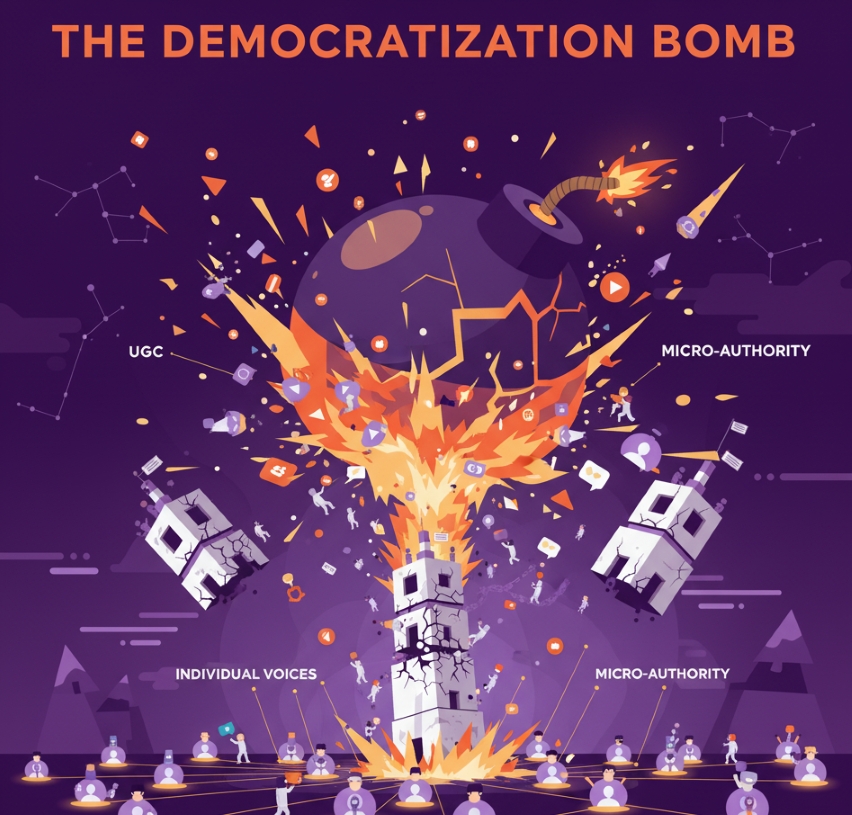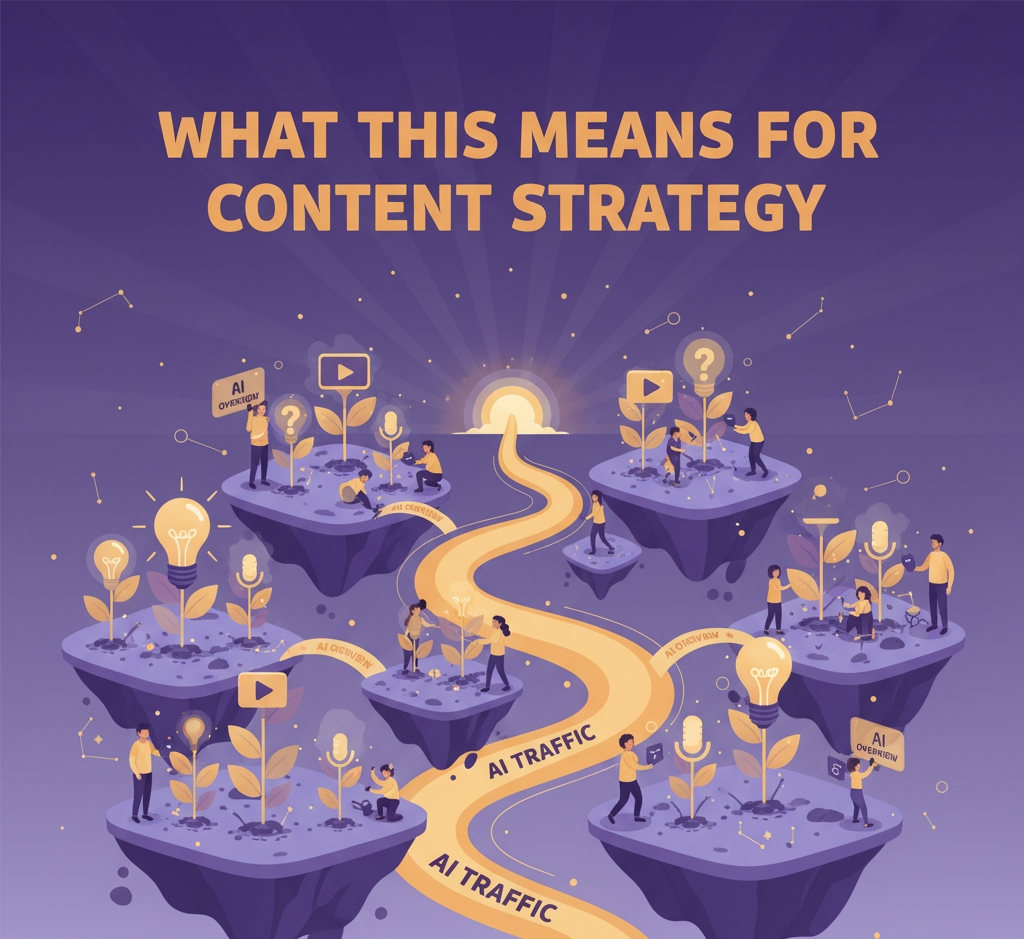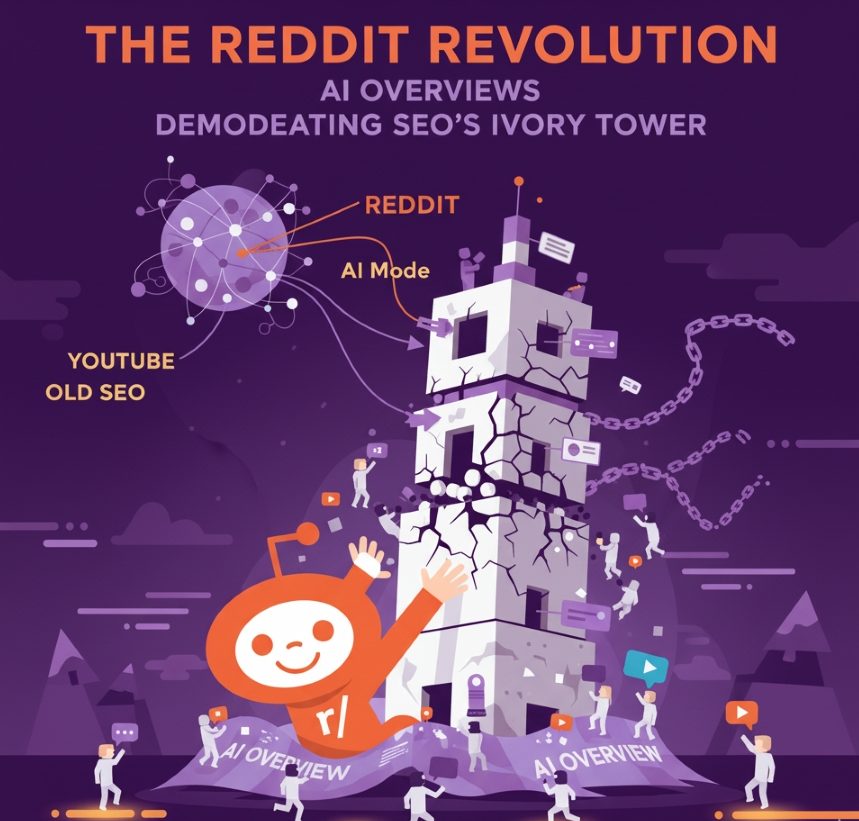Google spent the better part of a decade turning content creation into an elaborate game of Simon Says, where only the most credentialed, sanitized, and corporate-approved voices got to play. Need to rank for health advice? Better have an MD after your name. Want to discuss financial planning? Hope you’ve got those CFP credentials polished. The gospel of E-A-T (Expertise, Authoritativeness, Trustworthiness) became the holy trinity of SEO, creating a content aristocracy where genuine human experience took a backseat to institutional validation.
Then AI Overviews launched, and suddenly Google’s own technology is citing Reddit comments and YouTube videos like they’re academic journals. The same company that spent years telling us we needed white papers and medical degrees to rank is now having its AI quote “u/DeepFriedWisdom” explaining cryptocurrency to his mom in a r/explainlikeimfive thread.
This isn’t just ironic. It’s revolutionary. And it reveals something fascinating about how AI models recognize authority versus how traditional search algorithms do.
The Authenticity Algorithm
Here’s the thing traditional SEO missed: actual humans don’t communicate like content marketing robots. When someone asks “How do I fix my anxiety?” they don’t want a 2,000-word, keyword-optimized article that takes 15 paragraphs to suggest “maybe try breathing exercises.” They want the Reddit comment that says, “Dude, I had panic attacks for three years and here’s exactly what worked for me, including the weird thing with cold water that sounds stupid but isn’t.”
AI models are pattern-matching machines, and the pattern they’re recognizing isn’t institutional authority. It’s genuine problem-solving discourse. Reddit threads read like actual conversations between humans who’ve lived through stuff. YouTube videos capture the messy, trial-and-error reality of learning. This content has texture, personality, and most importantly, the linguistic fingerprints of authentic human experience.
Meanwhile, traditional “authoritative” content often reads like it was written by committee, optimized for bots rather than humans, and stripped of anything resembling a genuine voice. No wonder AI systems gravitate toward platforms where humans actually sound like humans.
The Democratization Bomb

This shift is quietly detonating the entire SEO power structure. For years, content marketing agencies charged five figures to crack Google’s algorithm, creating an expensive club where only brands with serious budgets could compete for visibility. The barrier to entry wasn’t just money. It was understanding an increasingly complex web of technical requirements, content guidelines, and authority signals that felt more like dark magic than marketing.
But if AI Overviews are elevating Reddit comments and YouTube creators over million-dollar content strategies, what happens to that exclusive club? Suddenly, the 19-year-old who makes TikToks about budgeting might have more algorithmic authority than the financial institution that spent six months developing their “Ultimate Guide to Personal Finance.”
This isn’t necessarily about AI being smarter. It’s about AI accidentally rewarding authenticity in ways that traditional search algorithms never could. When human experience beats institutional credentialing, we’re looking at the most significant democratization of online authority since, well, since the internet began.
The Conversation Economy
There’s something deeper happening here that goes beyond SEO tactics. We’re witnessing a fundamental shift from an information economy to a conversation economy. People don’t just want answers anymore. They want context, nuance, and the messy human reality behind those answers.
Traditional content marketing optimized for search treated information like a commodity to be packaged and delivered. But platforms like Reddit and YouTube operate more like ongoing conversations where knowledge is collaborative, evolving, and contextual. Someone asks a question, multiple people share experiences, others build on those responses, and eventually a collective understanding emerges that’s far richer than any single “authoritative” source could provide.
AI models seem to recognize this conversational texture as valuable signal. They’re not just looking for factual accuracy. They’re identifying content that demonstrates genuine human engagement with real problems.
The Authority Paradox
This creates a delicious paradox for the traditional notion of expertise. The cardiologist’s carefully crafted article about heart health might get passed over for a Reddit thread where someone documents their actual experience with cardiac rehabilitation, complete with the emotional journey, practical tips, and honest talk about what sucked.
Which one is more “authoritative”? The clinical expertise is undeniable, but the lived experience offers something equally valuable: relatability, practical application, and emotional intelligence. AI systems might be recognizing that authority isn’t just about credentials. It’s about usefulness, authenticity, and human connection.
What This Means for Content Strategy

If you’re still playing the old SEO game (obsessing over keyword density, building topic clusters, and manufacturing E-A-T signals) you might be optimizing for a world that no longer exists. The new game seems to reward genuinely helpful content that sounds like it was created by humans, for humans.
This doesn’t mean expertise doesn’t matter. But it suggests that expertise without authenticity, relatability, and genuine engagement is increasingly irrelevant. The most “authoritative” content might be the kind that admits uncertainty, acknowledges nuance, and treats readers like actual people rather than traffic metrics.
The Reddit Revolution isn’t just changing SEO. It’s challenging our fundamental assumptions about who gets to be an expert and what makes information trustworthy. In a world where AI systems can detect authenticity better than traditional algorithms, maybe the real authority was the conversations we had along the way.
And honestly? It’s about time.


Leave a Reply
You must be logged in to post a comment.